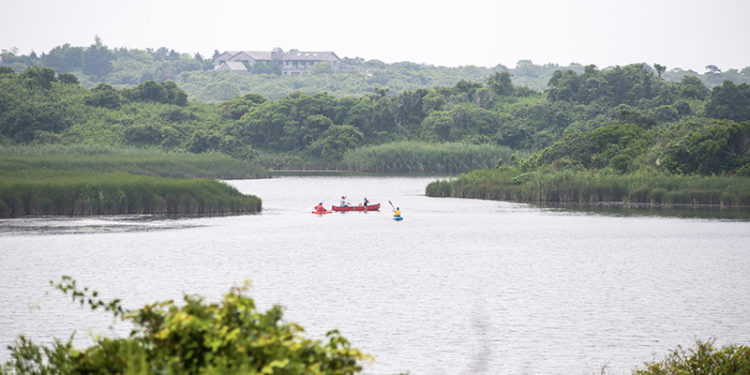An active cyanobacteria bloom advisory is in effect at Chilmark Middle Pond. The “red-grade” notice instructs pond visitors and pets against any and all contact with water and against any and all consumption of seafood.
“It is a genuine bloom in Chilmark Pond,” Chilmark Health Inspector Marina Lent told the Gazette.
The advisory was issued publicly on July 22. Members of the community had reported visible green pond scum the morning of July 21, Ms. Lent said. Immediately following these reports, she contacted the Great Pond Foundation, which monitors the presence of cyanobacteria across the Island ponds.
Samples taken by the foundation confirmed the presence of an active bloom, said Emily Reddington, executive director of the Great Pond Foundation.
“A bloom was reported, monitored and then analyzed, with messaging and warning going out to the community in 24 hours,” Ms. Reddington said.
Ms. Reddington added that samples have been sent to Stony Brook University for a toxin assay that will determine what, if any, cyanobacterial toxins are present in the pond.
As part of a continuing partnership with the Great Pond Foundation, Dr. Javier Lloret of the Marine Biological Laboratories in Woods Hole will collect benthic (pond floor) sentiment samples from Chilmark Pond this week to examine the sources of nutrient pollution that are known to contribute to cyanobacteria blooms.
The red-grade notice is the strongest health warning that the Island Boards of Health can issue in the event of a cyanobacteria bloom. Last week’s notice marks the first of the summer. Orange-grade notices, which advise against most water contact, have been issues and are still in effect for James Pond and Squibnocket Pond.
Ms. Reddington said that 2021 was the first year since 2018 that no cyanobacteria blooms had been reported on Chilmark Pond. Now, that appears to have been only a temporary reprieve.
“Across the island we’re seeing greater concentrations of cyanobacteria than 2021,” Ms. Reddington said. “Blooms across the northeast are up this year.”
Through their MV Cyano program, the Great Pond Foundation and Island Boards of Health report weekly on the health risks posed by cyanobacteria in Island ponds. Find more information atm greatpondfoundation.org/mvcyano/.
.








